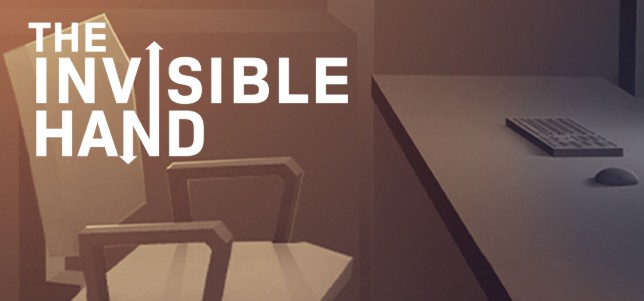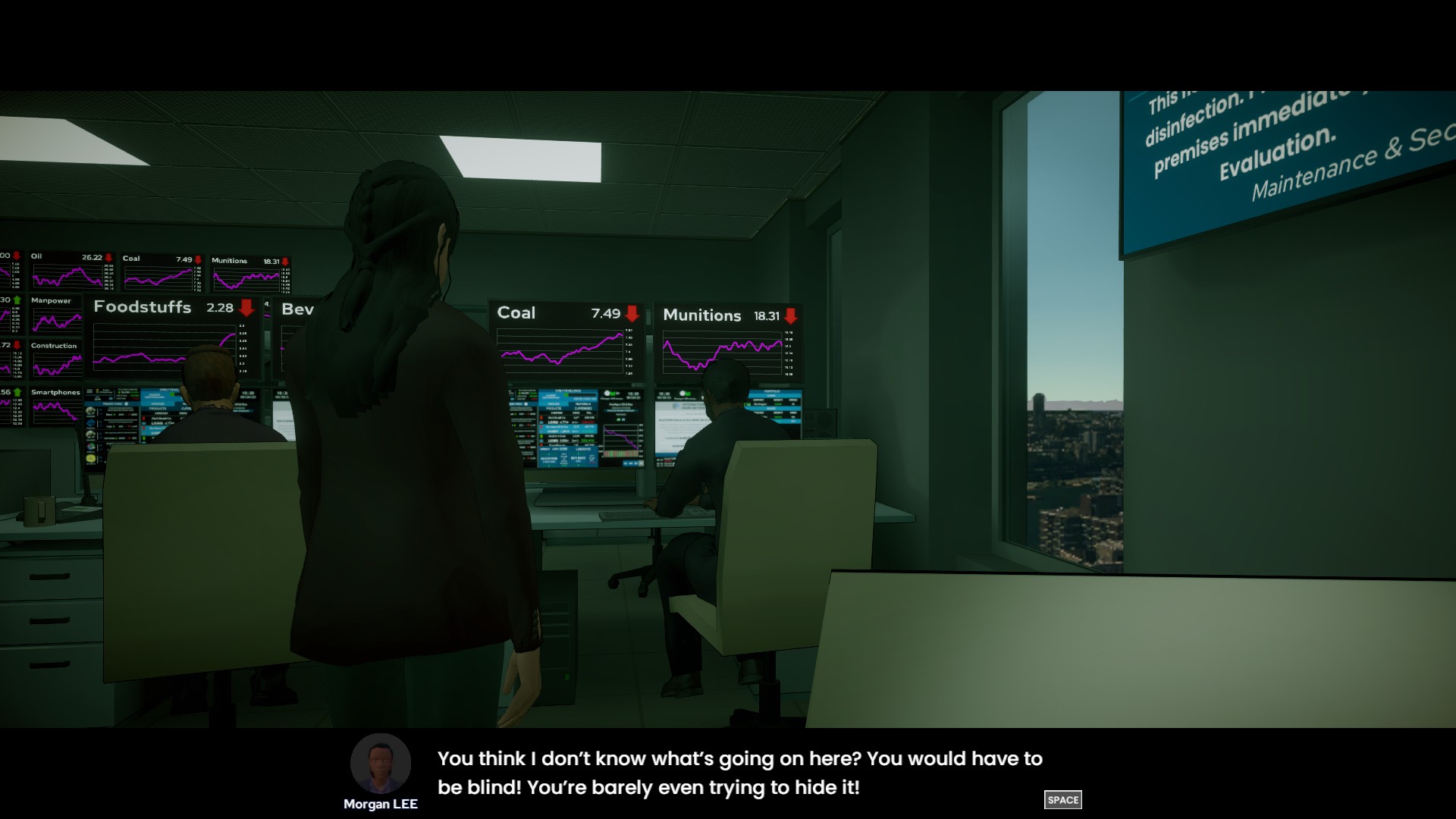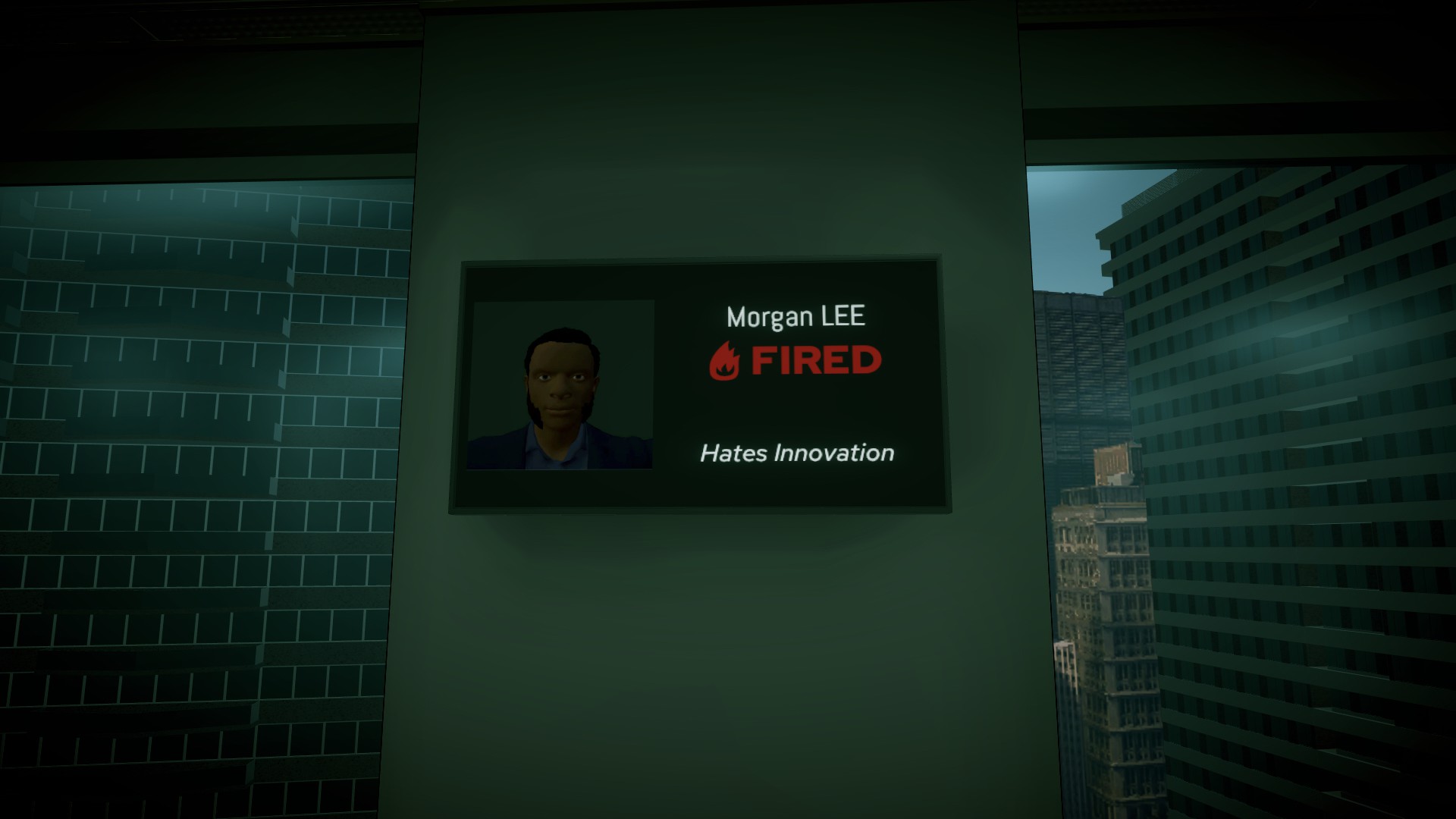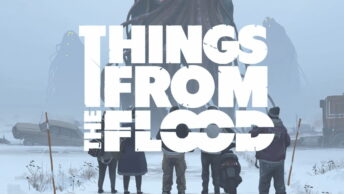Crime pays, but we’re going to lecture you about how bad the cool things you do in this game are.
Type: Single-player
Genre: Simulation
Developer: Power Struggle Games
Publisher: Fellow Traveller
Release date: 7 May, 2021


Intro
I could describe The Invisible Hand as a simulator of being a stock broker with some story to go with the gameplay, but honestly, this game doesn’t even try to hide that it’s mostly a political message that happens to have some perfunctory story and gameplay to get you complicit in the crimes that the game wants to yell about. In fact, this game was put into “LudaNarraCon”, which is hosted by its publisher, Fellow Traveler. As the name implies, this is for games that try to have a focus upon storytelling and telling that story through gameplay, which most games do to some extent, but this really leans heavy on the storytelling aspect. And The Invisible Hand seems to be from the Roger Ebert school of thought that if you have to ask what something symbolized, it didn’t, so it’s about as subtle with its message as a ball peen hammer to the face.
Politics in My Videogames?!
So basically, if you are the sort of person that gets angry when games preach politics, or at least, when reviewers point out that the game has pretty blatant political messages that you’ve been trying to ignore… just keep walking, buddy, this isn’t the game for you. The Invisible Hand is the gaming equivalent of climbing atop a soapbox and screaming at the top of your lungs into a bullhorn “THIS IS WHAT IS WRONG WITH OUR ECONOMIC SYSTEM!”
This also means that, while I’m giving the game a good overall review, that’s on its gameplay and how well it supports the narrative it tries to deliver and as an overall experience, but individual player mileage may vary based upon… let’s say their openness to the political ideology that is being expressed in this game. Or in other words, if you personally know a stock broker, and think it’s a totally legitimate or even admirable job, you probably are going to be quite offended, and this is your trigger warning. The only person who remotely acts ethically is the first person to get fired because they say he “hates innovation.”
On a slightly less aggressive note, the game also uses a ton of barely-concealed Ersatzes of real-life places and companies. For example, one of the biggest retail chains in the FreeStates Union is InfinityMart. The Yuric Dominion is the European Union (and this game goes by continent, not actual nation, so sorry Brexiteers, you’re still considered Yurics… and also, sorry Aussies and Africans, your continents don’t exist), while “Siana” apparently conglomerates all of Asia. A major portion of the game references a brewing economic collapse and civil war in “Balkuador”, whose name initially implies the Balkans, but the fact that their prime exports are oil and coffee shows the latter half of the name is the more important part, and Balkuador seems to represent a pastiche of Central and South America, and in particular, its history with American Capitalism.
Gameplay
The primary gameplay relies upon you walking into the office around 8:15 AM while the market opens at 9 AM, and closes at 6 PM. You tend to get any story parts of the game either now or at the closing bell, so that the trading part is totally focused upon the trades.
Time is continuous unless you pause the game (by opening the escape menu), meaning that dozens of events are going to be flung at you in a very rapid span of time. The default timescale has about 2 minutes passing per second, and this means you have about a five minute work day.
The coffee machine exists to give you a little control over the timescale. Coffee strangely slows you down, making time go by faster, while tea is the bullet time beverage. If you don’t mind the fact that the game is going to be green-tinted from then on (making it feel a bit like The Matrix), I highly recommend bee-lining for the triple-strength tea dispenser to stretch out your time to react. Well, that is unless you’ve basically won and you’re just sitting on dividends waiting to collect, in which case go for triple-strength buzz and fly through days in just a couple minutes.
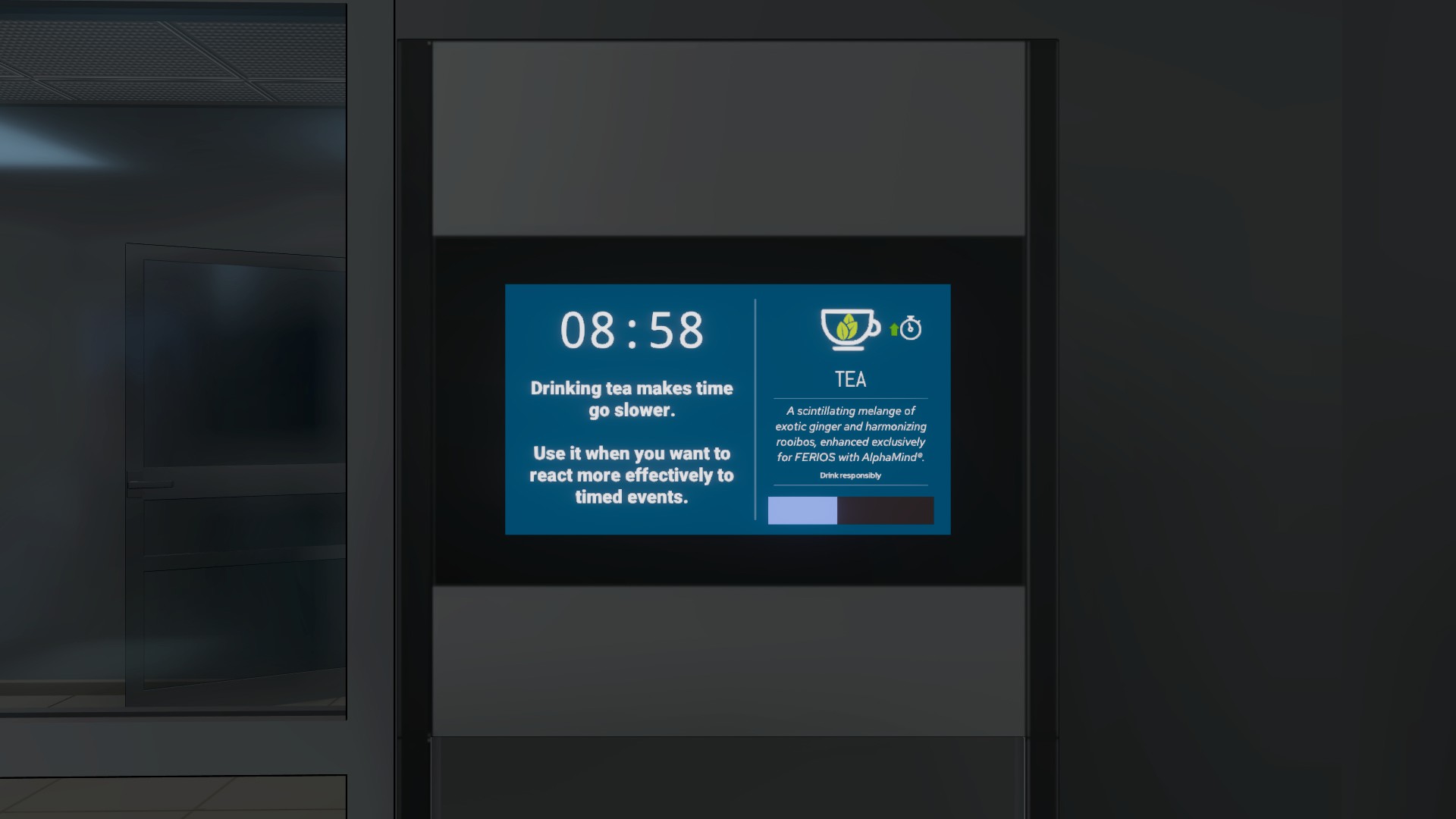
Stock trading is not all that different from what you would expect, however, in addition to the “buy low sell high” “long” type of purchasing stocks, you also have access to a “short” type. Shorts, if you haven’t been following GameStop news, are when you borrow stocks, sell them, then buy them back at a preferably lower price, effectively making it “buy high sell low”, meaning that whoever you borrowed your stocks from (typically a retirement fund of someone like your dad) takes a massive loss, but you get to keep a profit. The stock market industry doesn’t want you thinking too hard about that one.
On the left side of the board, you see a Trade Feed, which is basically a fake Twitter knockoff with people putting up tips for which stocks are going to rise or fall in the immediate future. The game says that these people have varying credibility, but they all seemed to have an effect, it was just that their effect could be drowned out by more powerful effects.
There are individual stocks, specific industries they belong to, and nation/continents with a currency. Up and down trends can be applied to a whole nation/currency (the Yuro is up), to an industry (all plastics are down), or a specific stock. In general, you want to bet everything on a stock when these trends are all aligning for the best profits.
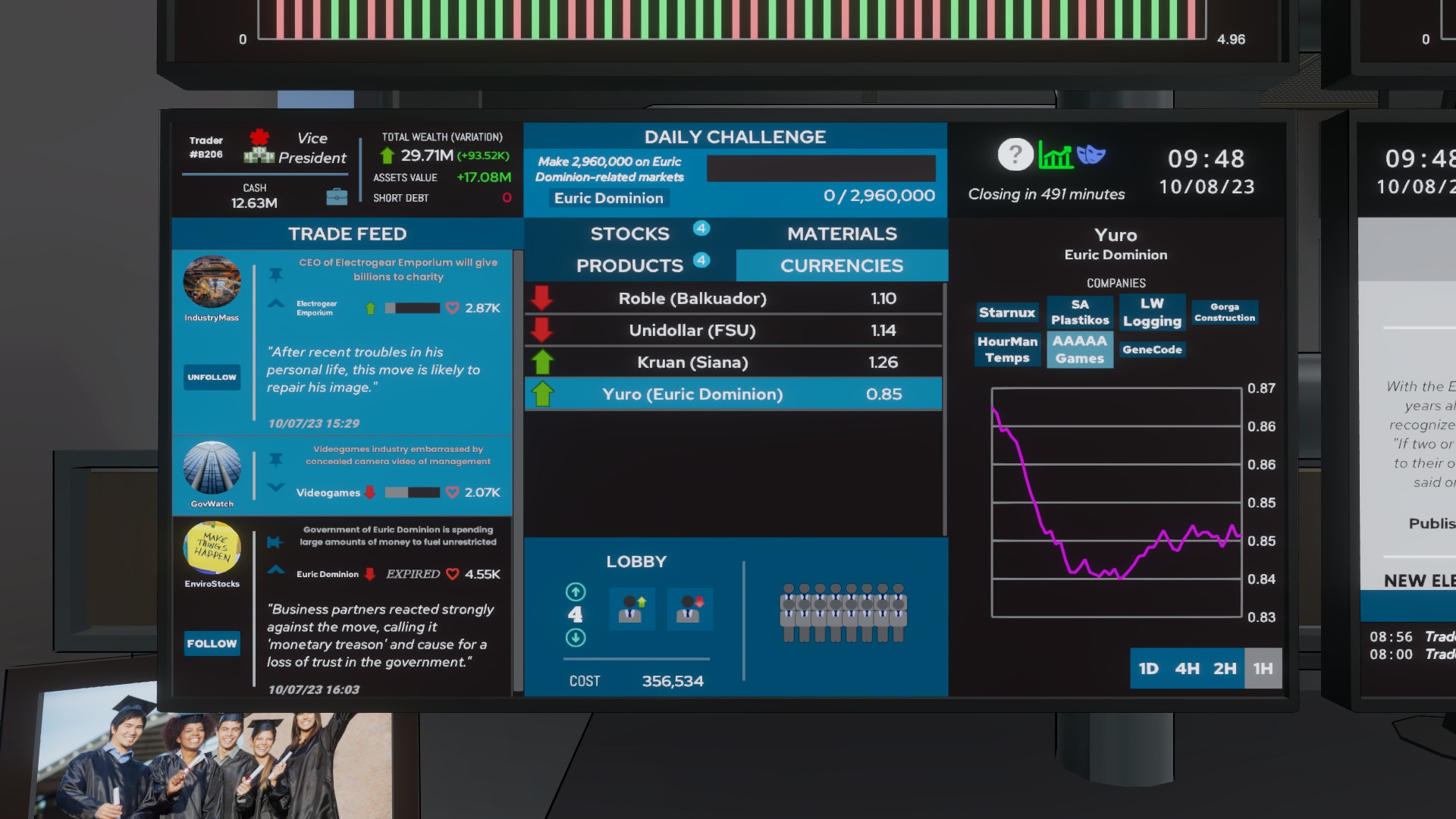
There are also limits to which stocks can be pushed. This seemingly exists as a way to push back against your own actions, but it gets triggered far more often by external actions, including the stock tips or rise or fall of a currency in general. What’s most important is that when a stock hits a danger zone, a red notice in your Trade Feed from the TIC pops up. These only last about 5 minutes (2-3 seconds in real time if you aren’t main-lining triple-strength tea), but can push the stock about 20% in one direction or another, making or losing you millions in literal seconds. This is the single biggest reason to go into tea-based bullet time, so as to ride these tsunamis to profit when they pop up.
As a final way to push the markets in your favor, mid-way through the game, you are given access to lobbyists. Lobbyists cost a little money, but they will forcibly push an industry or currency up or down (depending on your choice), however they can also draw negative PR to your company. Pushing a stock too far with lobbyists, of course, also triggers that snap-back, although a player aware of the limits can exploit it, pushing a stock down while shorting until they get close to the limit, selling off, then going massively long on the stock and taking advantage of the snap-back suddenly inflating the value from the sudden drop.
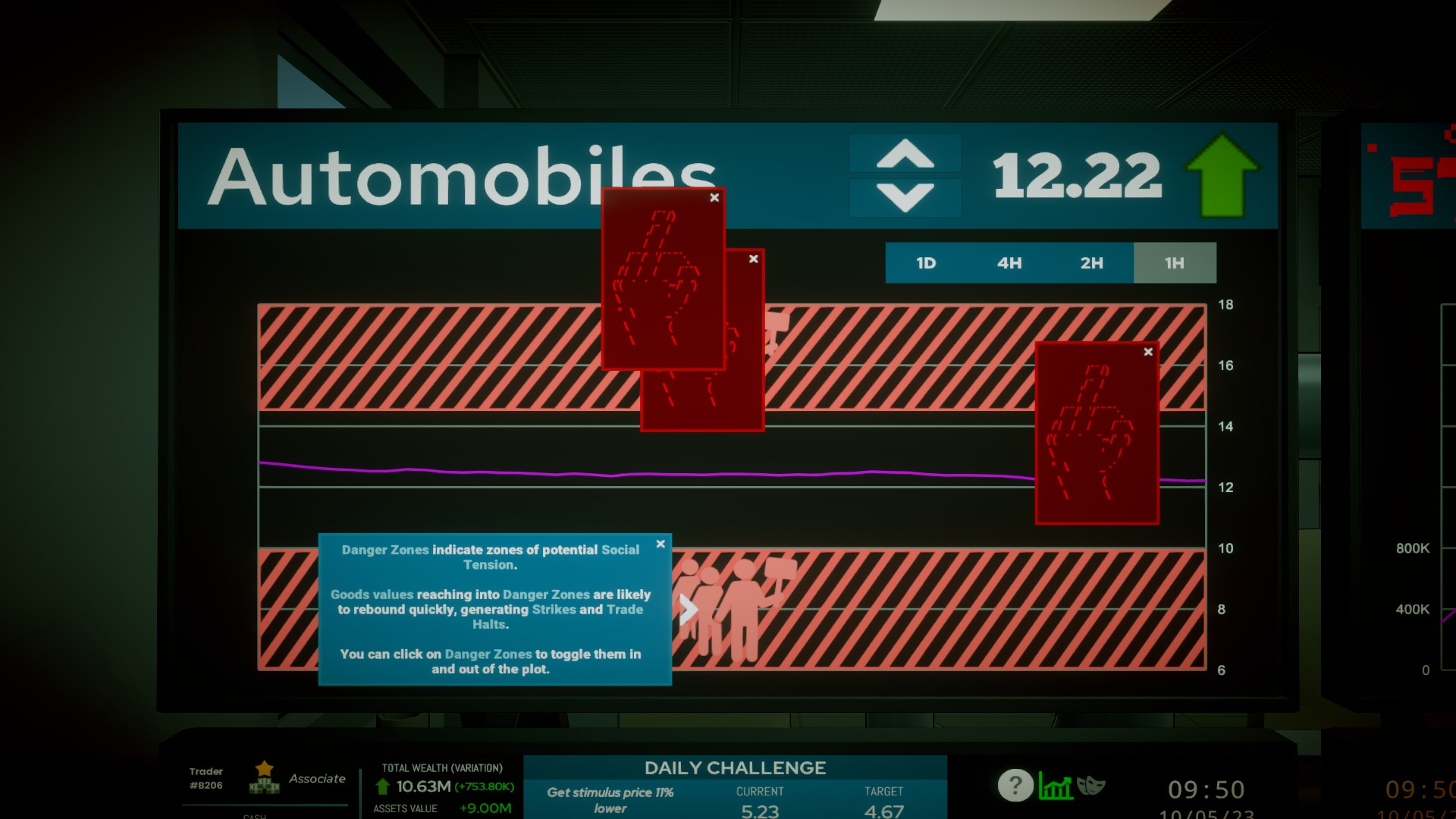
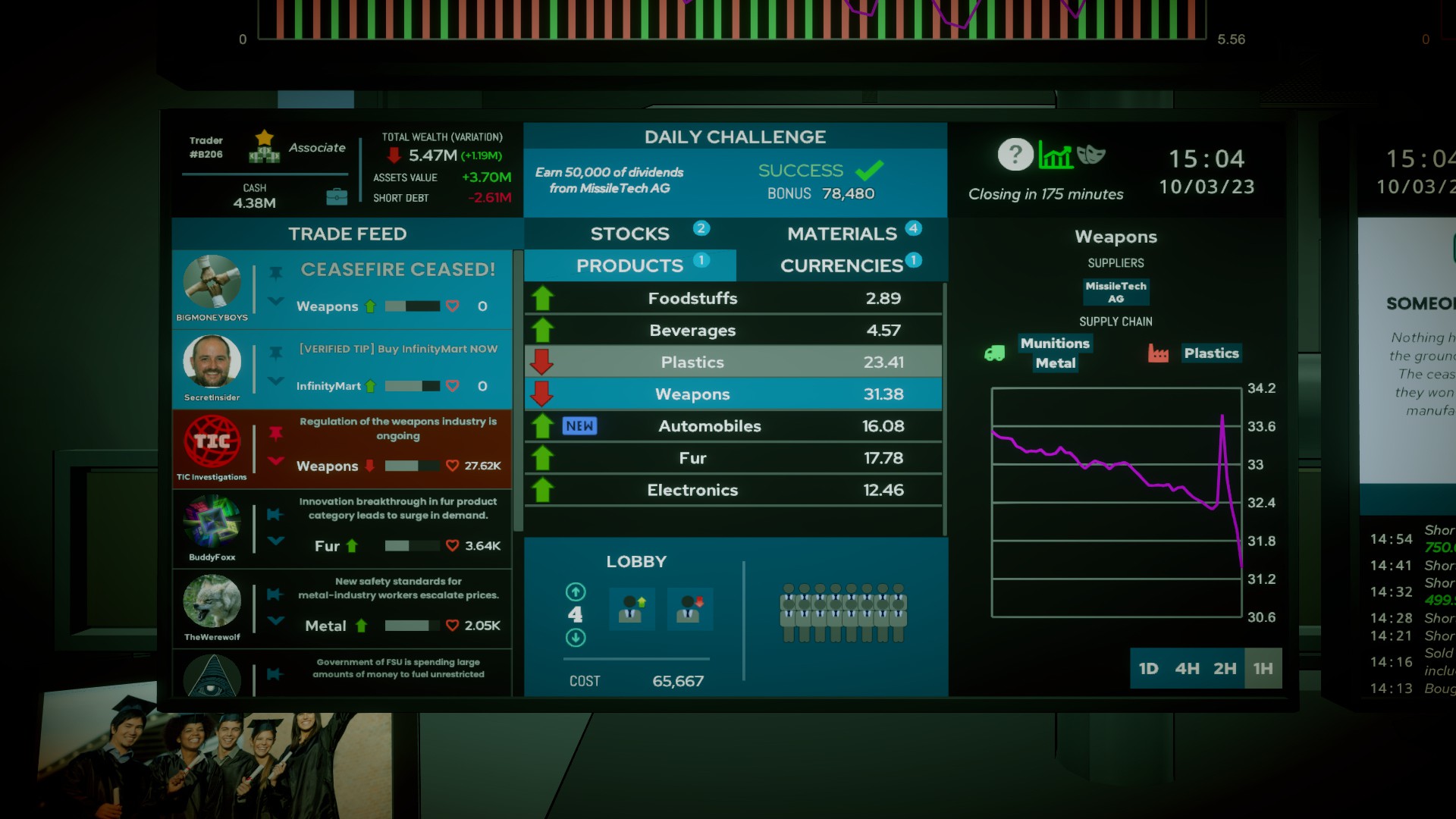
At the close of the market, you’re given an evaluation based upon whether you completed whatever arbitrary goal you were given that day (often something laughably small like “make 250k trading Freestate stocks”, when I could easily make 10 million), advance in rank if there aren’t more plot elements, and get shown that your “rival” has made some piddly amount of money. I can’t stress enough how much emphasis the game’s story puts on competition, how the game has an easy mode, and how even on “normal mode” (there is no hard), I effortlessly was making 50 times the profit the game appeared to expect of me, while the “perfect” traders that were my “competition” were often losing money.
Also at this time, there is a public opinion meter that goes up or down based upon how much lobbying you do. If you let it go all the way in the red from too much lobbying, there needs to be an emergency PR intervention. Get 5 of those, and the boss comes in and tells you you’re fired. You then come back to work the next day like nothing happened, although there’s a news report saying that you, personally, caused a stock market crash, but there are otherwise no consequences besides getting an achievement.
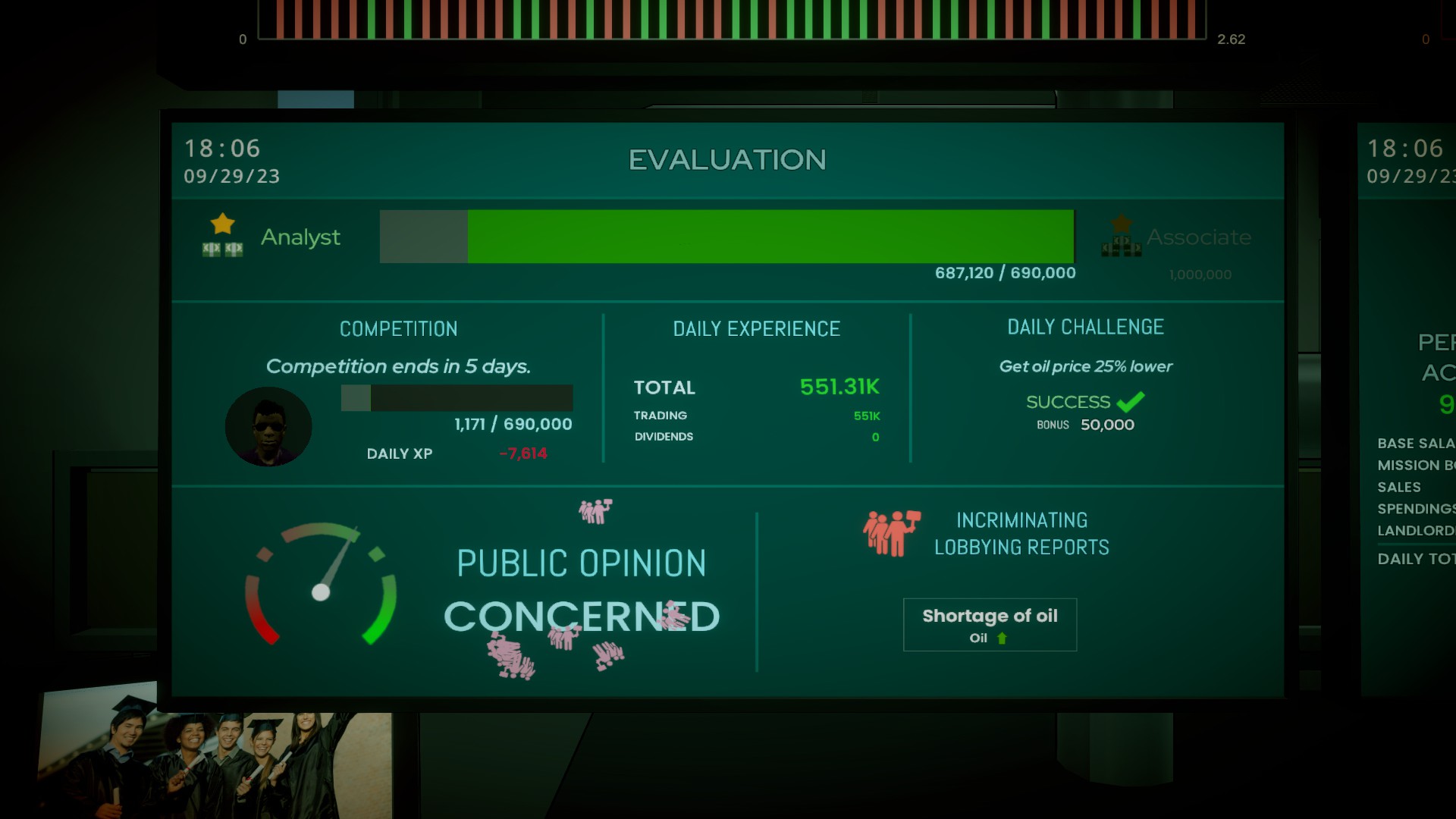
Before heading home, you can also buy random knick-knacks (from what amounts to “Lootboxes-R-Us”) or houses with your personal money that you get as commission from overkill on your profits.
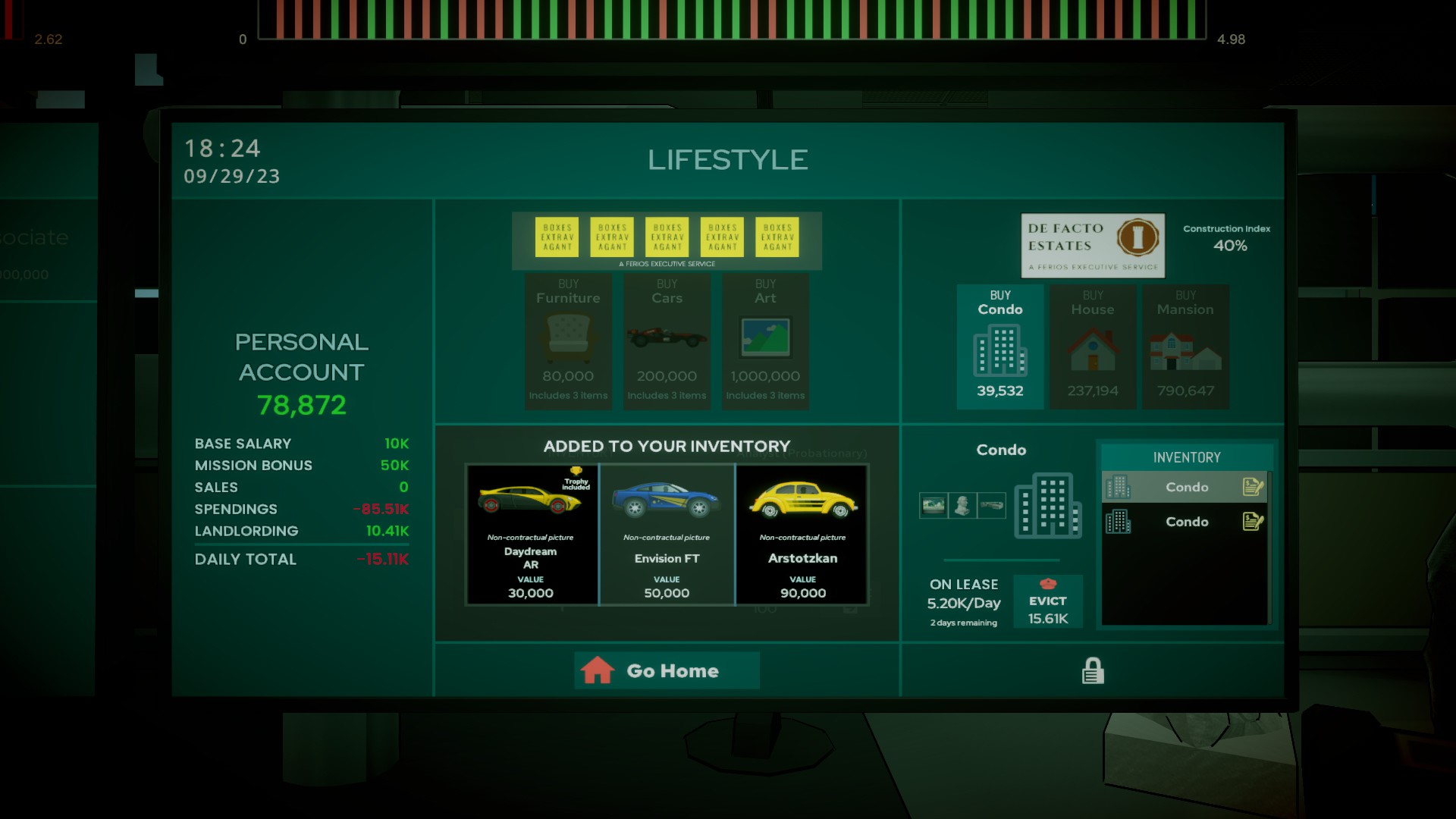
Some of the lootboxes come with trophies, which are small things like pictures of your new car or mansion you can put on your desk. Or someone else’s desk. Or just throw it at someone. It’s not important to the game, but a nice touch.
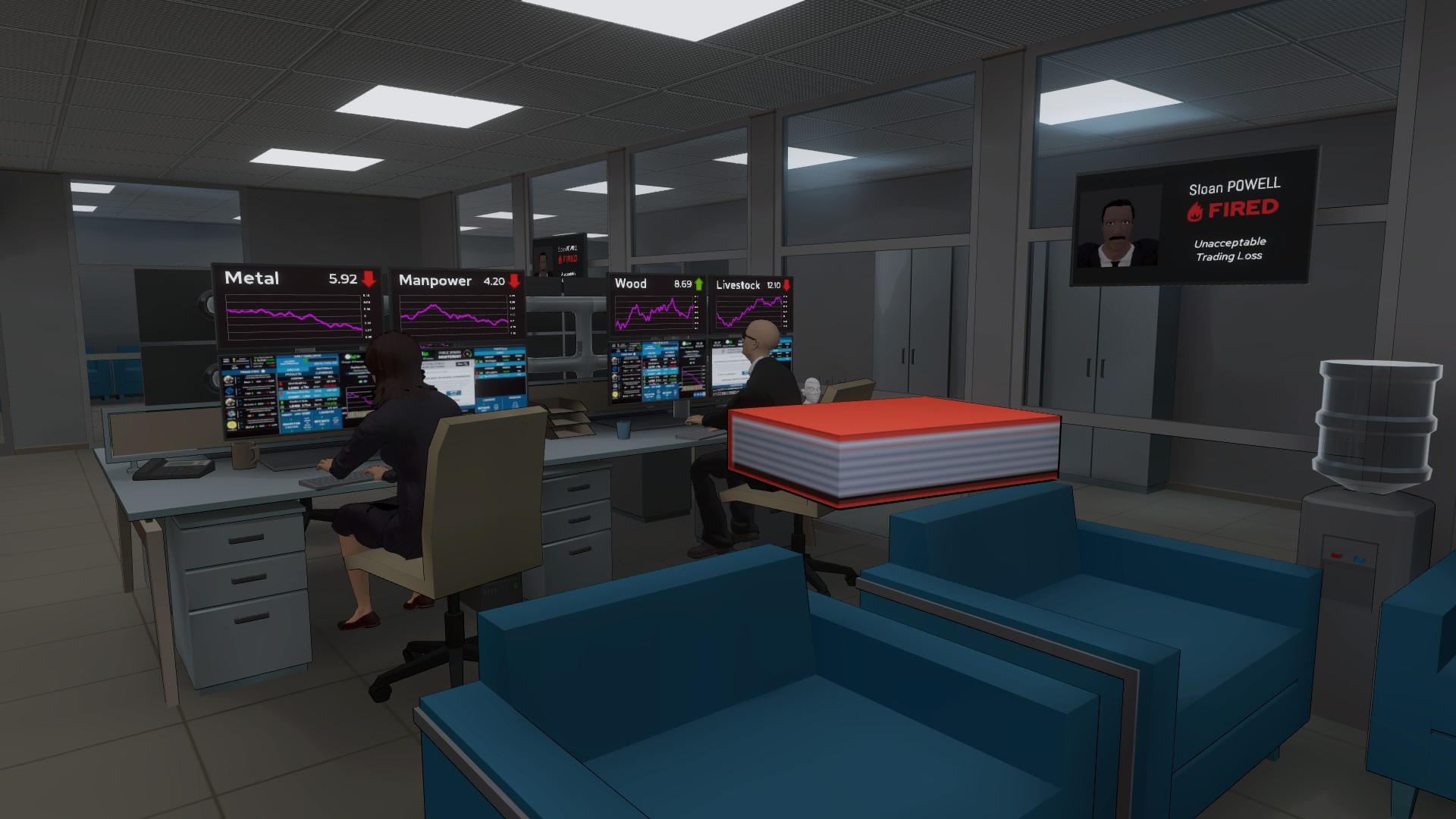
Expanding Pies
Before delving into what this game itself says about the stock market, I think it’s worth laying some foundation so everyone knows some of the terms I’m going to throw out in judging this game’s message.
Let’s talk veeeery loosely about Game Theory (and no, about it’s economics, not video games). To simplify economics, they break scenarios up into games where players can either “cooperate” with other players for mutual gain or “defect”, and betray other players to gain as much for themselves as they can while harming everyone else around them. Game Theory is a model of understanding human behavior that seeks to let people understand when certain situations inherently reward people for defecting (harming others), and how to avoid those and instead build systems that encourage cooperation (helping others).
A zero-sum game is something like a poker game. For you to make money at poker, someone else has to lose money because there’s never a change in the total amount of money at the table (except when someone new joins or leaves). Cooperation can only help when seeking to eliminate a mark two competitors agree to cooperate against temporarily, but ultimately, they are all opponents. Zero-sum games inherently force competition, which inherently pushes defection so that all players constantly see all other players as enemies to be defeated.
Now consider a lumber mill. Trees have little economic value (we’re ignoring the environment for the purposes of this mental exercise, and also labor conditions while we’re at it), but when cut down by lumberjacks, they turn into trunks with slightly more value, then get sawed into planks at the mill for moderate value, then get sent to a furniture company or used to build a house for even greater value. Every step along the way, workers are adding value to the goods they work upon. While, granted, only the workers that directly saw the logs are creating the product that is adding value, the other workers at the mill – the janitors, the mechanics that repair the sawmill machines, the middle-managers and HR guys and secretaries that keep the business running – they all add value in their own way by supporting the primary adding of value. (And yes, even services and creation of digital goods like games or even writing reviews of games – even when they’re negative about a game you like – are still adding value to the economy.)
Unlike a zero-sum game, these economic processes are variable-sum. In fact, the total amount of added value of an entire country is called Gross Domestic Product, or GDP. “Cooperation” through division of labor is the foundation upon which all civilization is built. The economy writ large is a massive cooperative, variable-sum game. This is the thing economists gesture vaguely towards when they talk about “enlarging the pie”.
This changes, however, with the stock market. The stock market does not add value directly, and only very tangentially can claim to support the adding of value through allowing start-up investors to dump their stocks. (Something only a tiny minority of people in the stock market ever do.) By and large, the stock market is where the excess added value above the pay the workers who added the value to the products in the first place go, and stock brokers are fighting one another in a zero-sum game to try to claim all the added values of others. It is a major point of controversy and political discourse that the overwhelming bulk of the money in the world exists in this zero sum game that does not help the global economy or grow the pie while the overwhelming bulk of people do not get the majority of the share of the value they added, to put it lightly, which is something that has become an even greater point of contention since the crash of 2008.
There is, for example, zero economic value to shorting stocks. It exists purely in the realm of a zero-sum game where one investor is gambling to try to get money out of the accounts of another investor, often a dummy hedge fund account that is a collection of retirement accounts.
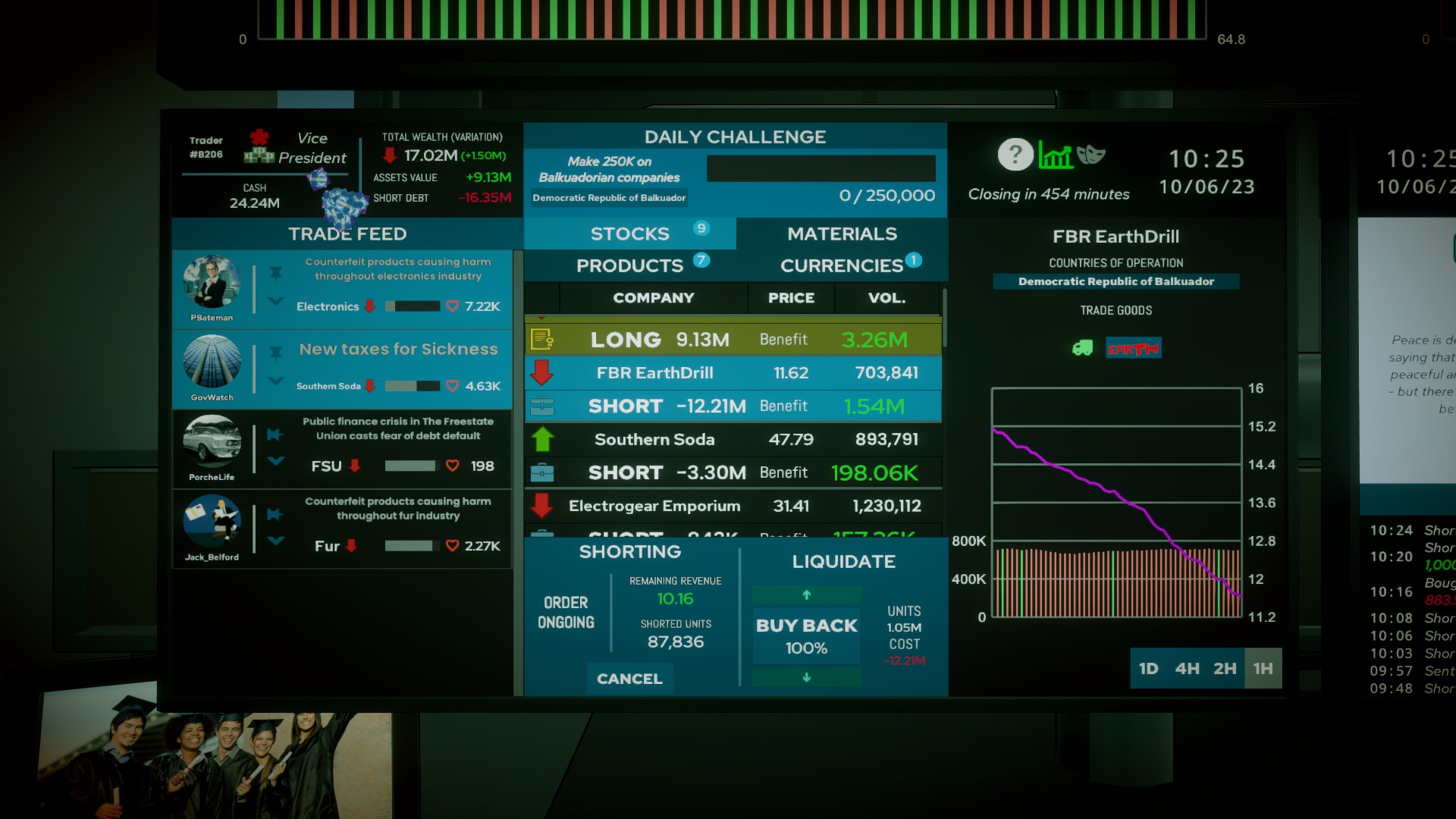
Shorting stocks is a particular point of contention, however, because it isn’t even all zero-sum. Shorting stocks makes a stock broker money when a stock goes down, and while every business is presumably trying equally hard to make their stock prices go up, it’s very easy to make a stock price go down deliberately to make money off of shorting in a maneuver not entirely unlike insurance fraud. Since the markets are so volatile in the information age that someone like Elon Musk tweeting about Dogecoin can make a joke currency actually gain real-world value, it’s possible, for example, for a personality with a television show to short a stock, then go on air saying that stock is about to tank, and everyone should sell everything, driving stock prices down, and therefore making the short make money for the person who deliberately drove the stock price down. Having Jim Cramer of Mad Money come out and say how bad shorting was before showing a clip of Jim Cramer saying he loves to short stocks in exactly the sketchy way I just outlined was a key point of why the Jon Stewart interview was so devastating to Jim Cramer… or should have been. See, the problem was, Cramer’s target demographic are the sort of stock brokers that take doing something like cheating to make money (even if they’re the rubes in his scheme) as a sign that he really is a smart person who makes a lot of money, so they follow him even more when he’s revealed to be a hypocrite who engages in severely unethical trades at his audience’s expense.
The Invisible Hand seeks to pierce through the confusion by generally simplifying the message to a really blunt and moralistic one where stock brokers are just outright destroying the economy wholesale.
Spoilers
While I try to avoid having spoilers sections in reviews, the problem is that this game is one of those “Oops! All Allegory!” types where the “plot” is really just an excuse for the metaphors to be thrown around. This isn’t helped by the fact that basically all of the plot twists are spoiled by the trailer. You don’t have context, but you know certain events are coming and if you just read between the lines a little, you already know the plot. So, I don’t like making a “Spoiler” section that will ruin the game for people, and would encourage those who are interested to just skip to playing the game and reading this section after you’ve played to get the “full experience”.
That out of the way, let’s discuss why this game exists.
In discussions about author’s intent/8th grade book reports, there’s three questions you’re supposed to ask about the author’s intent with a work to judge how well it works as a theme of a book.
First is to ask, “what the intent of the work was in the first place?” This is, again, about as subtle as a ball-peen hammer to the face.
The Invisible Hand goes way beyond saying that the stock market adds no value. It outright states that stock brokers are basically psychopaths that put profits before human lives and all the most vitriolic slogans of the 2009 recession. Stock brokers in this game have no redeeming features and do active harm that destroys the economy if not creates wars. (The title “The Invisible Hand” is basically an explicit declaration that market brokers are the hand that drives the market, and often to ruin.) Not to put too fine a point on it, but this game does not believe the stock market should be allowed to exist.
I’ll skip ahead a bit and ask the third next because it’s short and I want to spend the rest of the section on the second question without letting the third question feel like an anti-climax. Third is to ask, “was this message one worth writing about in the first place?”
The exact policy proposal might be debatable, but it’s hardly as though the broad topic of the degree of freedom the stock market should be given in pursuit of profit is a topic not worth bringing up in recent years. It is especially hard to look at how the only person ever brought to trial for the 2008 crash was someone who spoke out against the broker he worked for and that the bulk of the bailout went to the corporations that caused the crash in the first place and see this as any kind of coherent policy rather than the impact of corporate lobbying, and only the people directly profiting from the current system seem happy with it.
So that brings us to the second question, which is, “how effective was the author in making their argument?” And in this, I think that The Invisible Hand stumbles. It makes its point clear as day, but it makes its point so vehemently at the player while putting the player in the shoes of the ‘villain’ that it actually winds up weakening its own point.
The game starts you off with an “ethics evaluation” whose questions the game mocks directly and which the company had already pre-filled the correct answers for you so that you just need to slap “continue” as fast as possible. The employee overseeing your test outright mocks you if you take any time to read the questions and think about them.
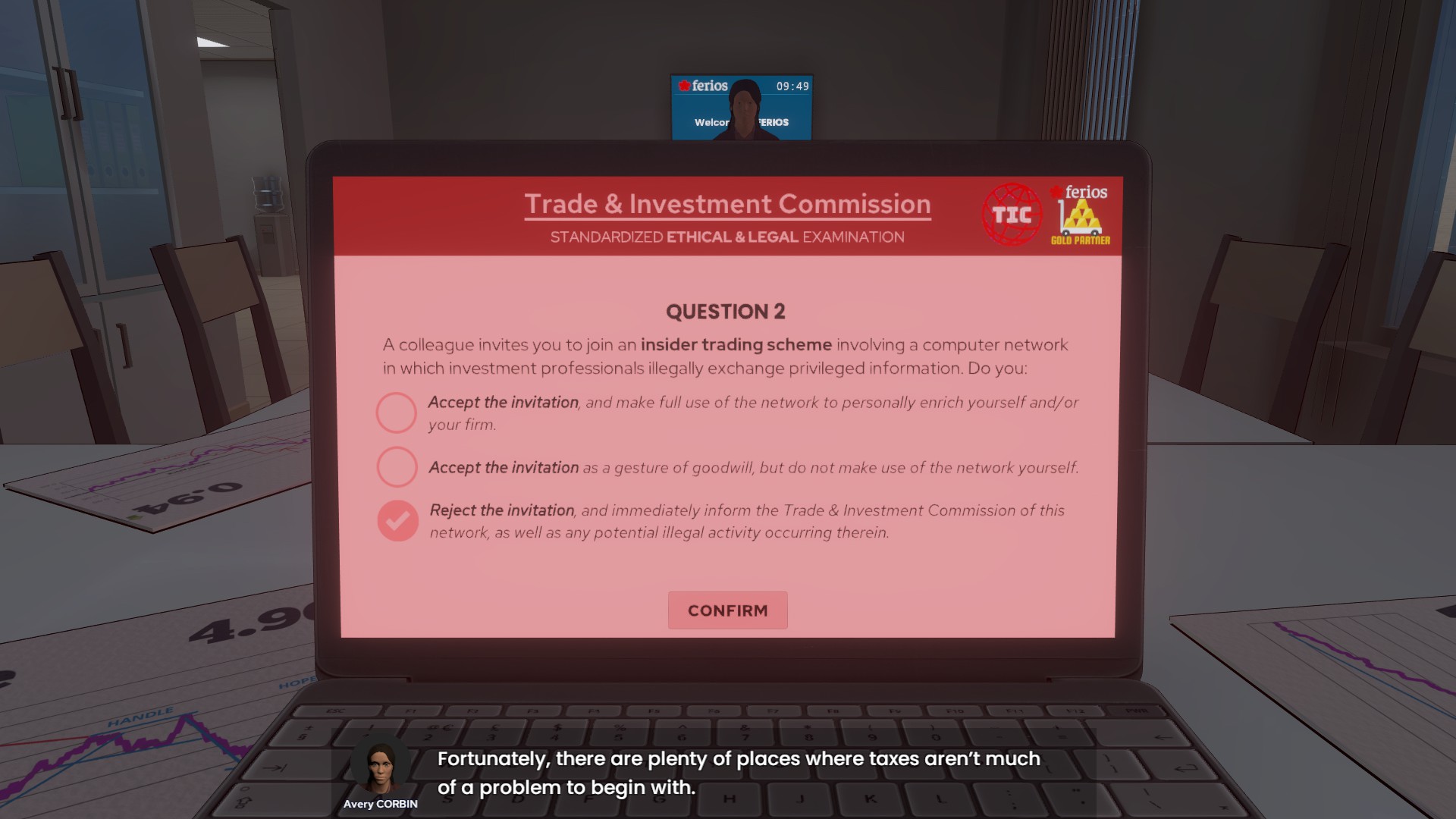
Upon being given your job at Ferios, you’re put into a competition where the loser gets fired. The winner gets promoted and put into another competition where the loser gets fired. Someone unimportant gets fired on days between plot events for things like not making enough money. Nobody new is hired after you, so the office is literally empty but the nepotism secretary and your last competitor by the end.
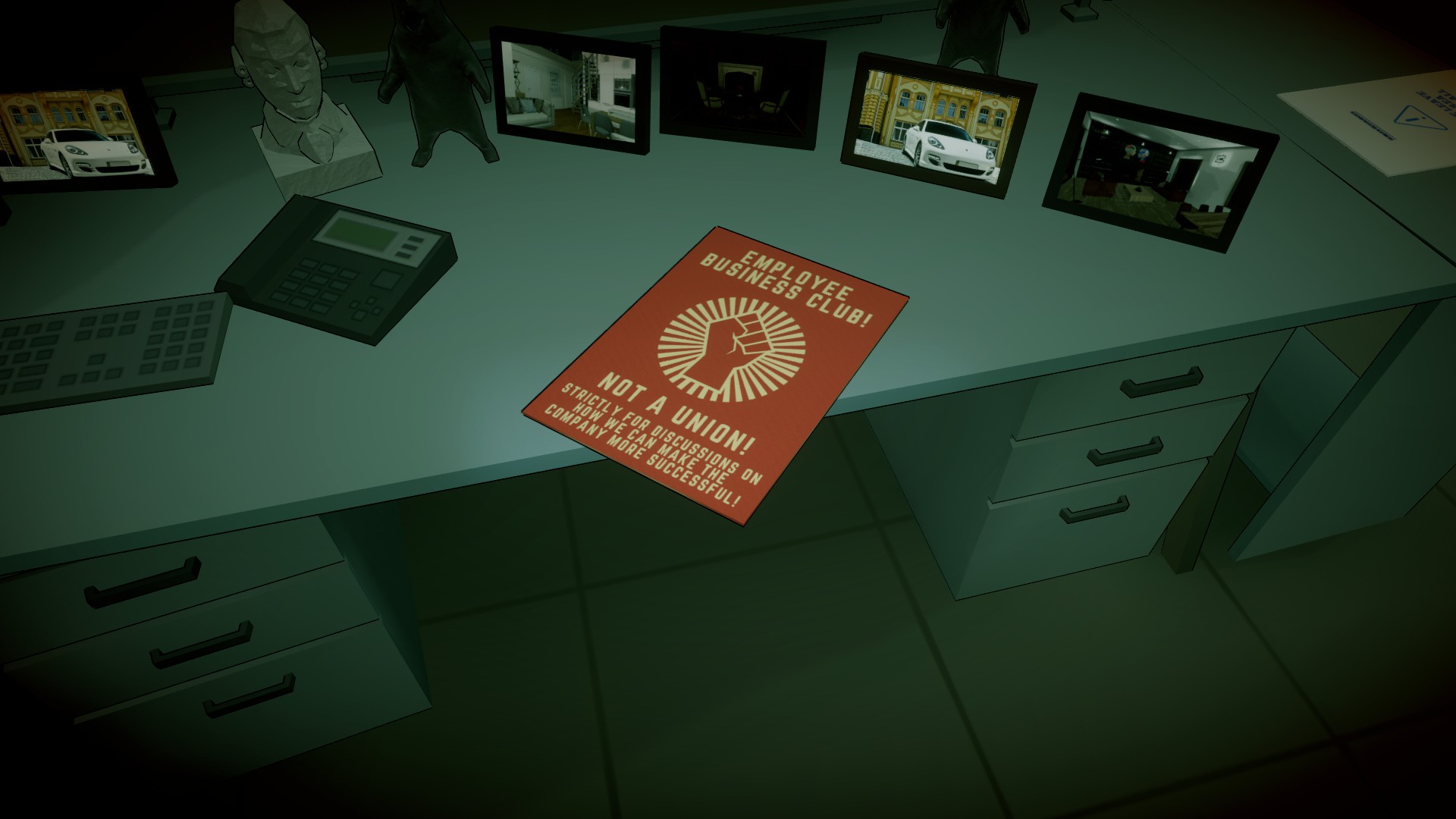
The game starts you off in your competition by having your ‘mentor’ character give you a tip on how to win one over on your competition. You probably don’t need it, but it’s important to the plot, so even if you didn’t try to trade based upon their advice, the game will still act like you did.
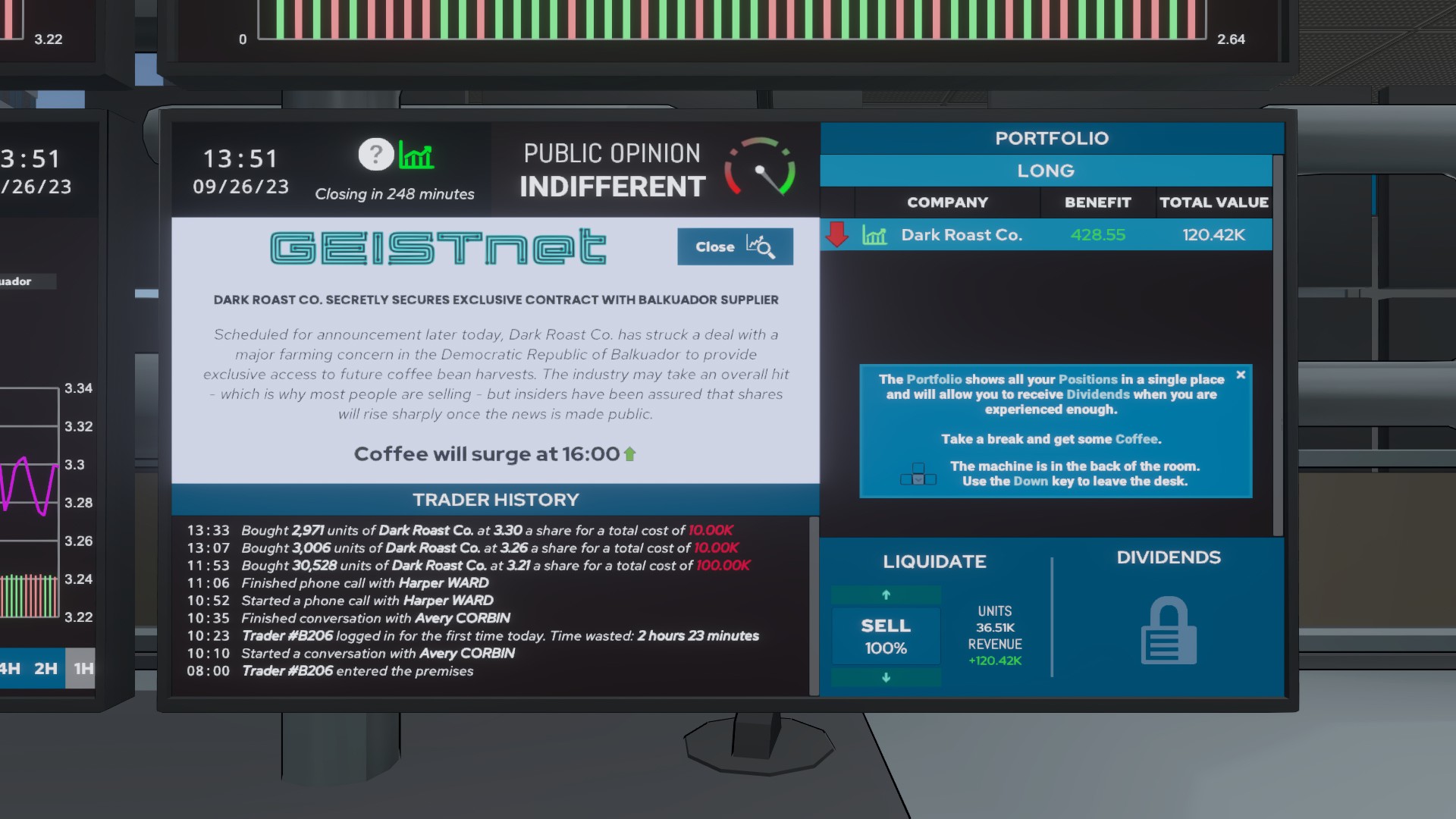
The main plot thread is that Blakuador is seized by a civil war that was the result of you lobbying against the bailout of their oil industry. (Bailing out the oil industry is considered a pure good in this game, apparently, and avoiding a government bailout of big business is bad.) During this time, you’re told to do things like short the oil industry to make money off its collapse or invest in weapons so that you can get dividends when the Balkuador government stomps on rebels. A ceasefire was called, but it turns out Freestates senators wanted to keep the war going because the war is big business. (This of course being references to several undeclared wars in Central America the real United States involved itself in.) Apparently, the game treats that as solely our personal fault, even though I sure didn’t have anything to do with that one.
The Invisible Hand’s writers know other writers who use subtext, and declare them all to be cowards. Therefore, at the end of the game, when it’s time to figuratively put the player on trial and make them reflect upon their actions, they literally have regulators arrest the player and put them on trial for the actions they had to take to advance the plot.
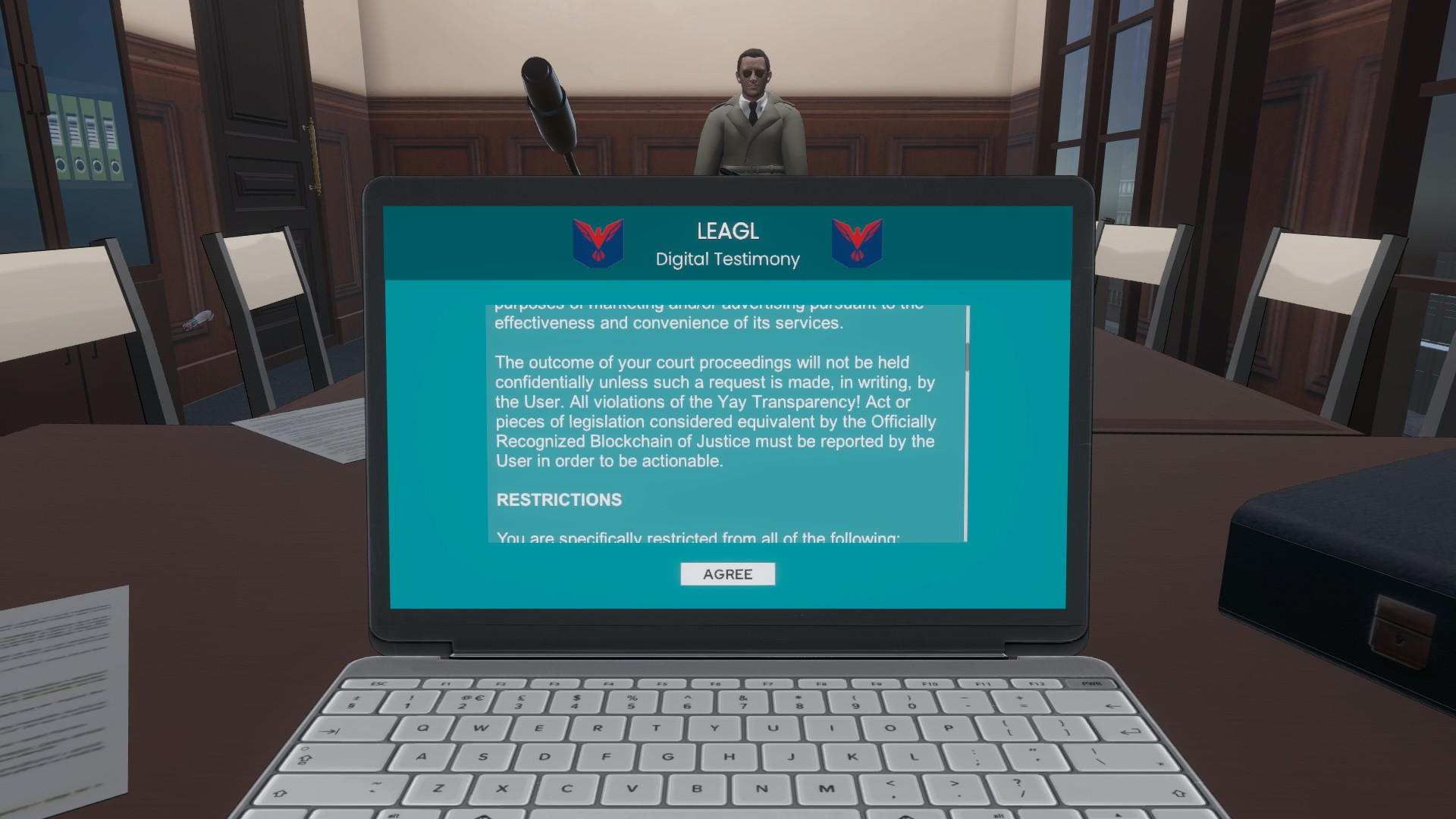
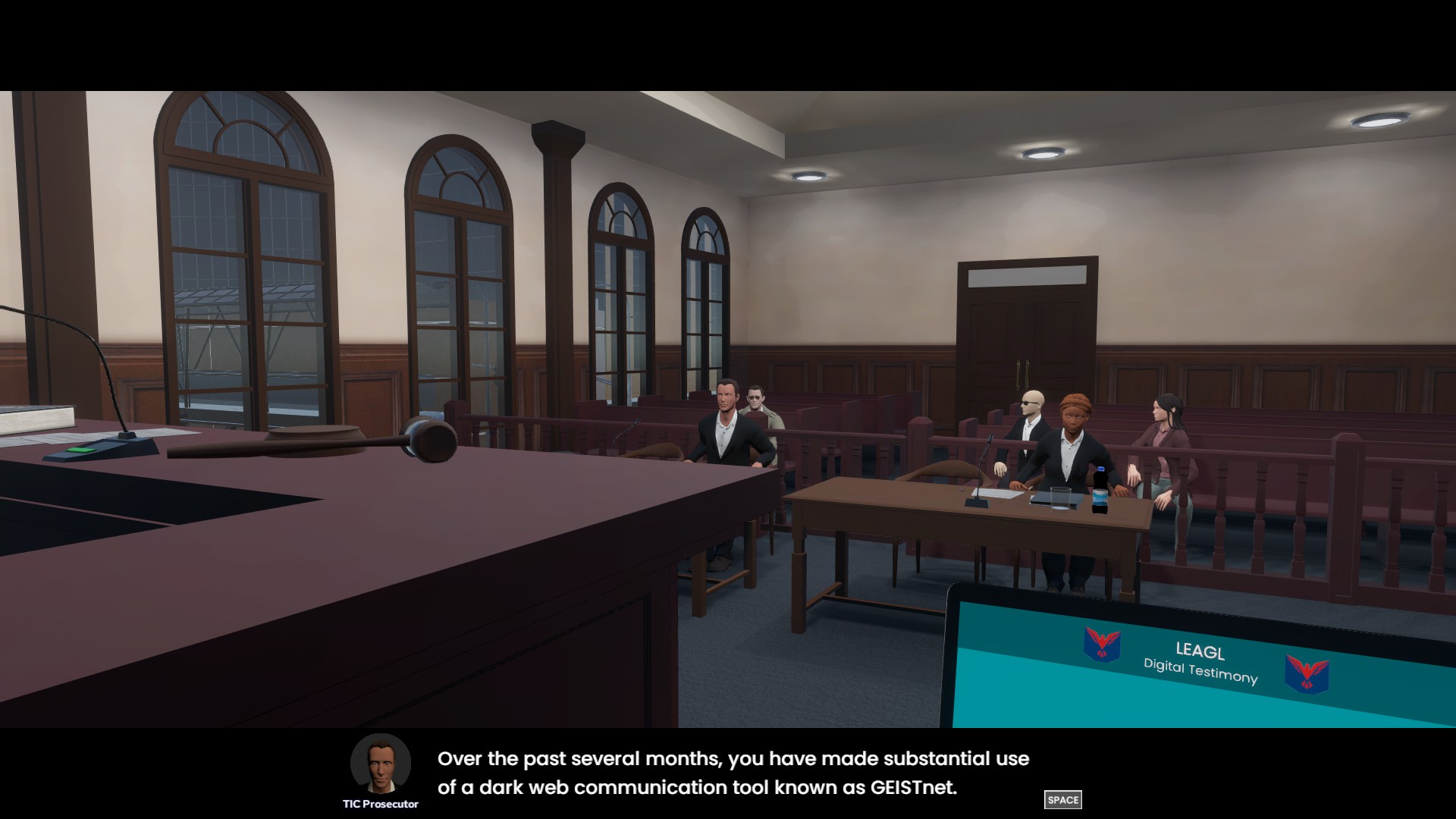
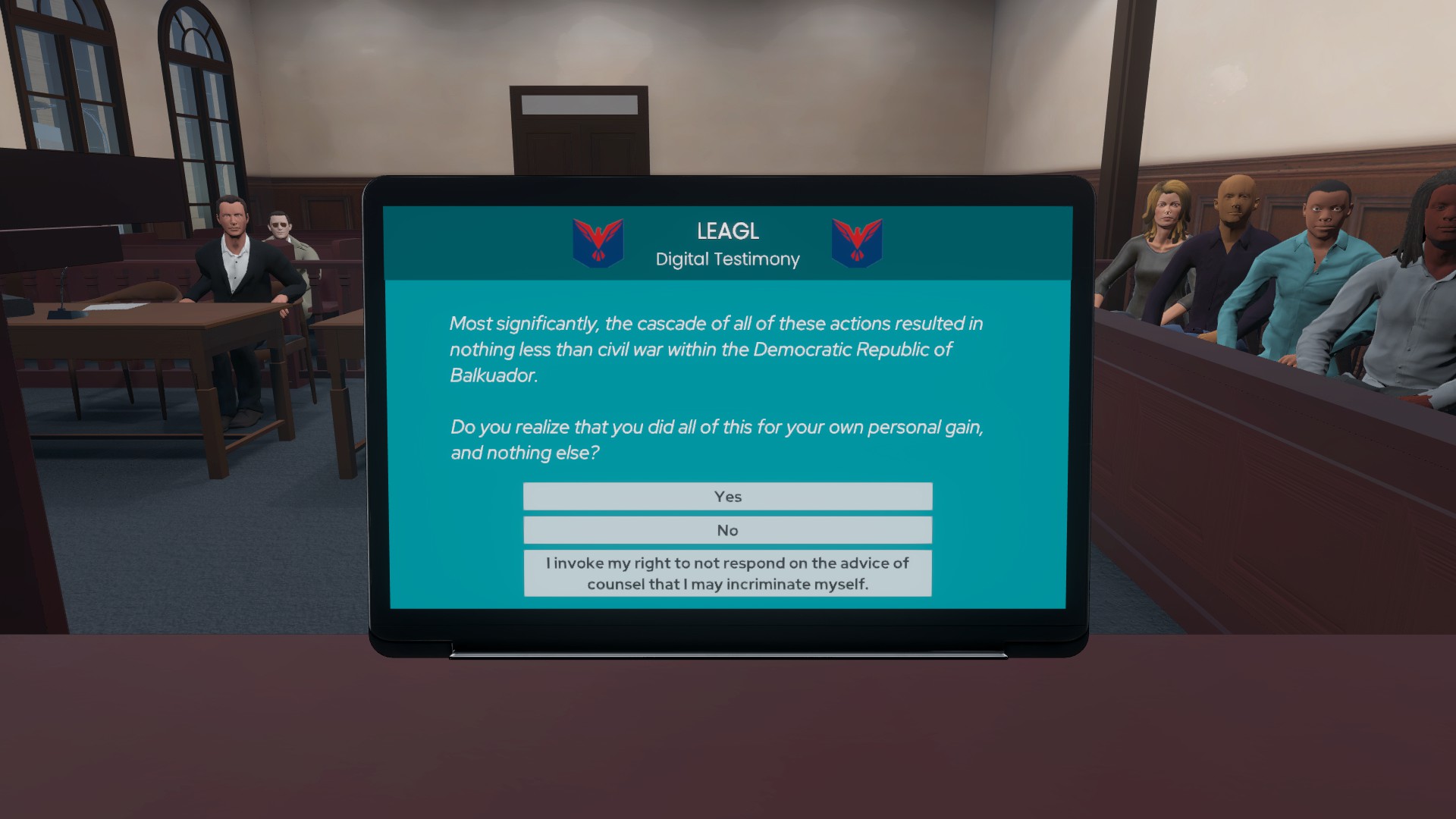
The problem is that this trial is a sham and any judge would punt the attorney out of his court for making a case so blatantly about just pointing a finger at the defendant and saying “you’re a bad bad poopy head mean person!” Lobbying is not a crime, and any fallout of that lobbying is therefore also not a crime. (Now, maybe there should be laws against it, that’s an argument that might theoretically be one you could make, but that’s not the argument being made, this game is declaring you guilty of the crime of lobbying.) Outside of that first insider trading thing, nothing you did was a crime, so most of the trial is a sham where they’re accusing you of things that aren’t crimes.
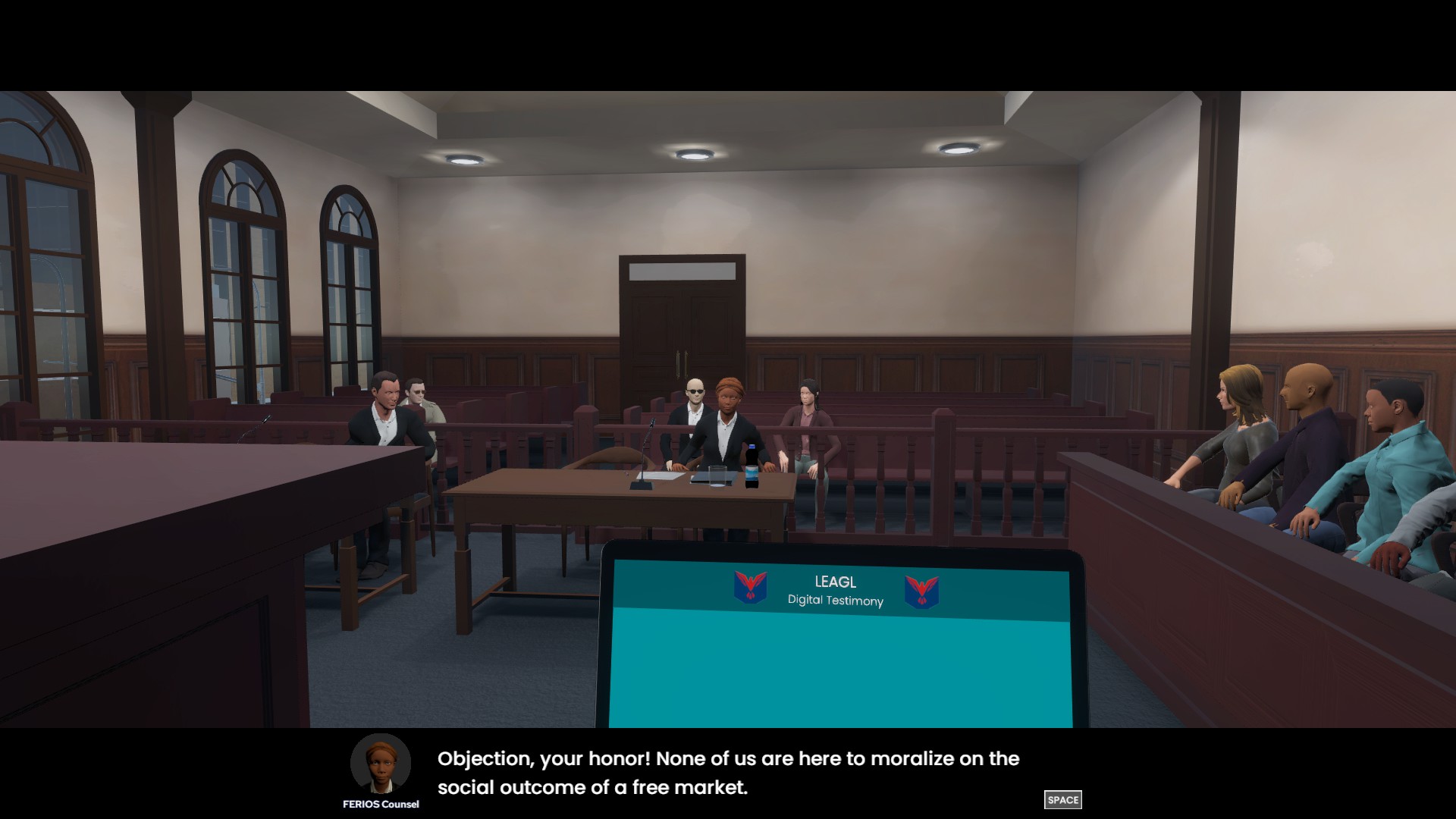
Worse, the game tries to present its moralization entirely through a faceless regulator who always wears sunglasses and yells at you all the time. If you wanted to gain sympathy from the player, and make them question what they were doing was really worth it, you would need to focus on the actual victims of your actions. You get TOLD about 57,000 Balkuadorians dying off-screen, but their deaths are an unintended consequence of the actions of many different people and you’re never SHOWN any of the ramifications other than a stock ticker telling you that you’re getting rich.
The pathological inability to see past the numbers is a good point in the game’s favor during gameplay, but you need to see a Balkuadorian suffer in real life, not just someone say Balkuadorians suffering somewhere else is a sad, sad thing, and they really feel sorry for them. The hedge fund baby nepotism secretary even says that whole “how sad is it those poor other country people suffer?” line to you directly, and it’s a joke because she’s one of the ones profiting from it! That kind of kills your message when you’re given more reason to empathize with the hedge fund nepotism secretary that gives worthless platitudes about praying for Balkuador while working for a company that keeps the war going to profit off it than the person it wants to shine as the beacon of moral purity.
In fact, the only people you actually see suffer because of your actions are the other rivals that get fired when you when the competitions Ferios keeps putting you in, and everyone but the first guy is portrayed as a psycopath to ensure you don’t feel sorry for them.
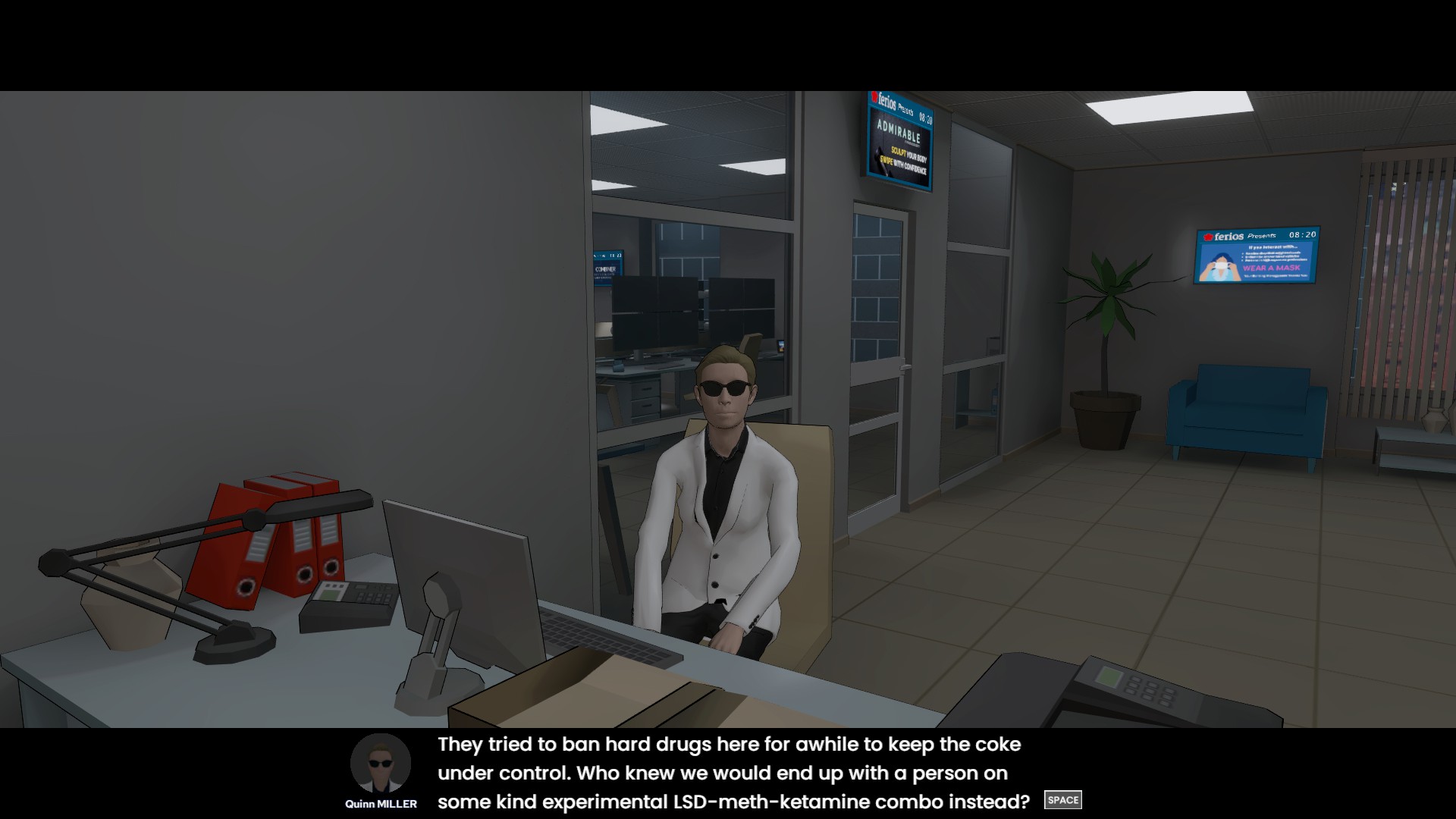
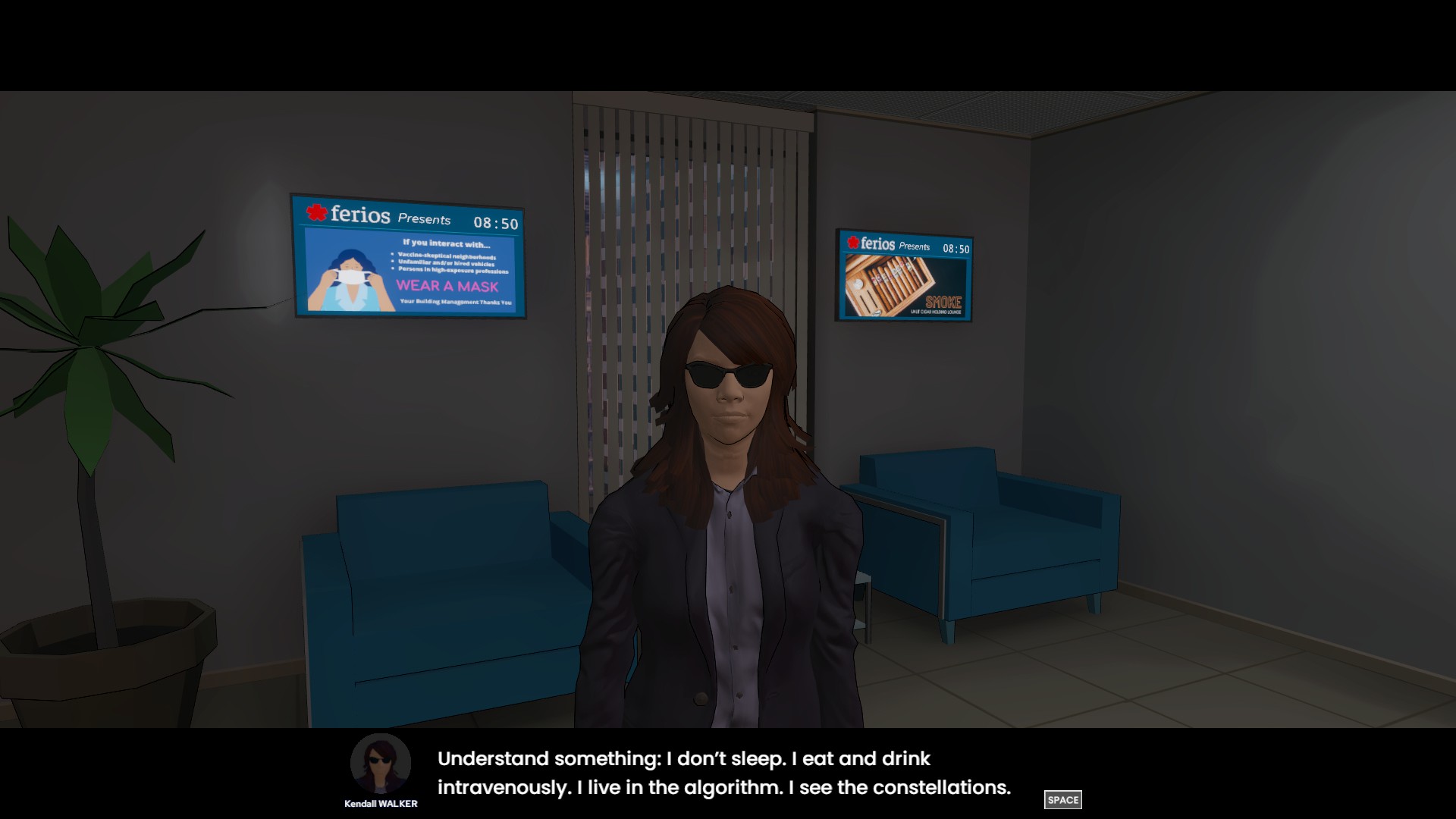
The game has several different endings, depending on a couple choices right at the end. One has you turn state’s evidence against your employer to save yourself (“Snitches get Riches”), while others have you take the fall, which involves a million dollar fine you can go to jail if you don’t want to pay for some reason, or you can just pay it with your millions in the bank and go free and straight back to all the crimes you were arrested for committing. (Which is the real ending, as far as I’m concerned, since it kind of shows how ill-equipped the justice system is for dealing with financial crimes.) The other lets you decide to say you learned a lesson or something and just quit being a stock broker after paying your fine and walking away from the business with more money than you will ever need.
Graphics and Sound
As any look at the screenshots will show you, this game is made with fairly abstract graphics, what appears to be some sort of stock character models, and a few real pictures that maybe have a filter over them for some background elements. This is a short budget game, and the budget hit in the graphics department. I don’t think cutting costs on the graphics is a terrible thing, but I do think that good art direction trumps graphics power, and there could have been more done to keep a more unified abstract art style going. Perhaps a more pared-down version of humans so that they look even more simple and abstract? It would help sell the dehumanizing tone a little better, if nothing else.
Music-wise, the game has some elevator music of sorts running most of the time. It fits the scenes the game takes place in, and the game isn’t so long I felt a need to play my own music, but if I were to continue playing for a significant period of time past where I stopped, I would likely start playing my own music.
Sound effects are relatively few, but they have opening bell sounds and the like. They don’t stand out in a negative way except for some of the airhorn sounds that could play at times, but those are supposed to be annoying. This isn’t the sort of game where sound effects can really sell such an abstract concept, but they can still bring a game down, and in this game, they’re well-deployed.
Also, on the topic of sound, the game features “speech” in the same way as Banjo-Kazooie, where they have characters subtitled, but the noise they make is actually “badabadabadabadub”.
Interface and Options
The Invisible Hand has all the standard options one would expect, including key rebinding, which not all indie games remember to have, so this one gets good marks for that.
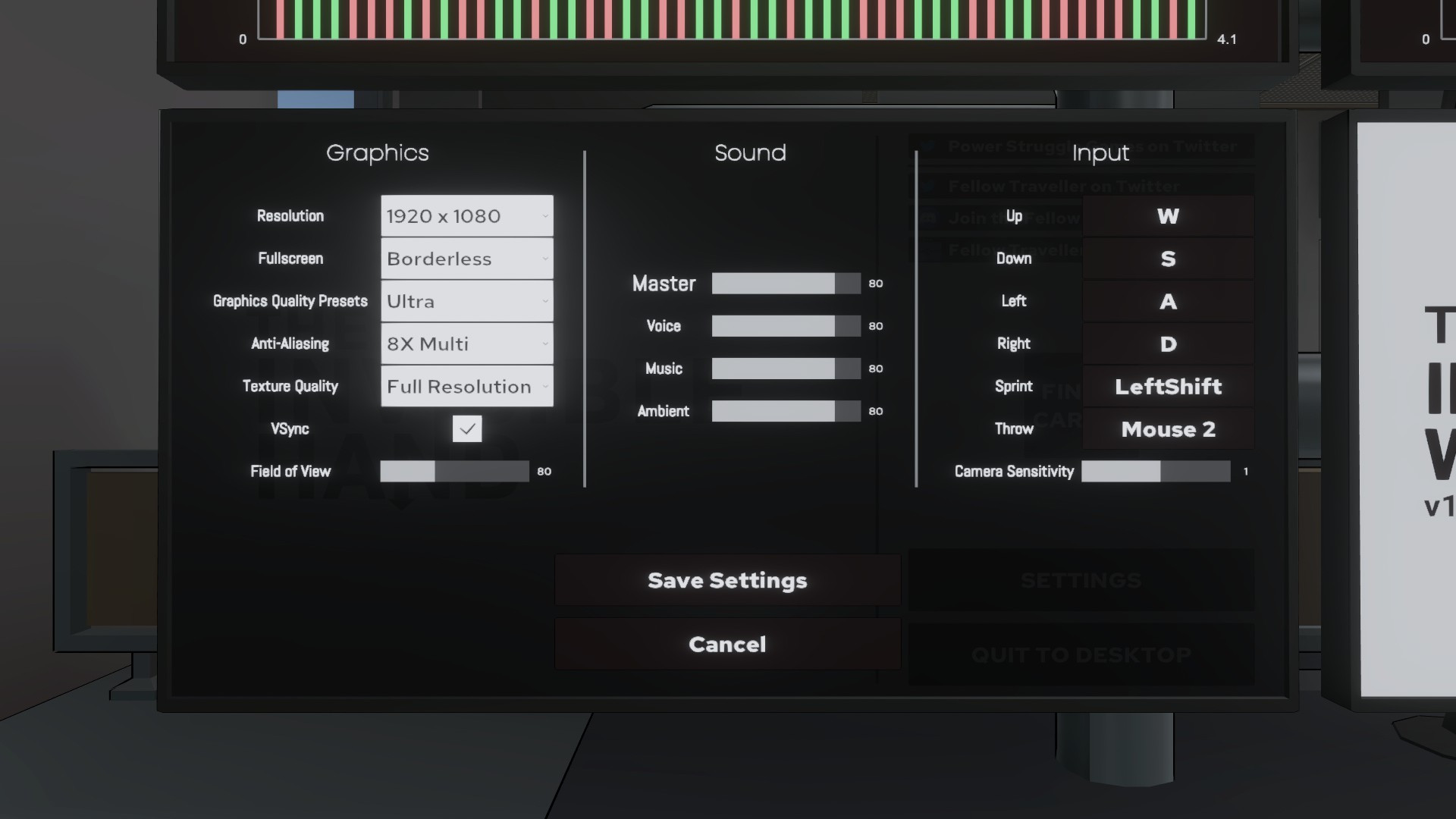
When walking around, the game has a fairly “walking simulator” interface, while the computer interface is almost strictly mouse-based. This is totally ordinary stuff, with only the part where you can pick up and move things around being slightly different. The picking up objects mechanic automatically orients things right-side-up and you have to right click to rotate them, and this makes putting things on your desk a lot easier than older Source Engine-style Havok fizziks. It’s a nice touch, if really tangential to the game as a whole.
Verdict
Story-wise, this game does a decent job arguing its message (which may be controversial) up until it fumbles it by failing to really make players see the consequences of their actions at the end, while on the gameplay front, this game is short, and doesn’t have many mechanics to reveal, which actually go together well, since it means it doesn’t overstay its welcome.
Pick it up for a few good laughs with its black comedy and you’ll have an enjoyable afternoon of play, but you probably won’t come back to this one once its story is complete, since it has little else to offer.

